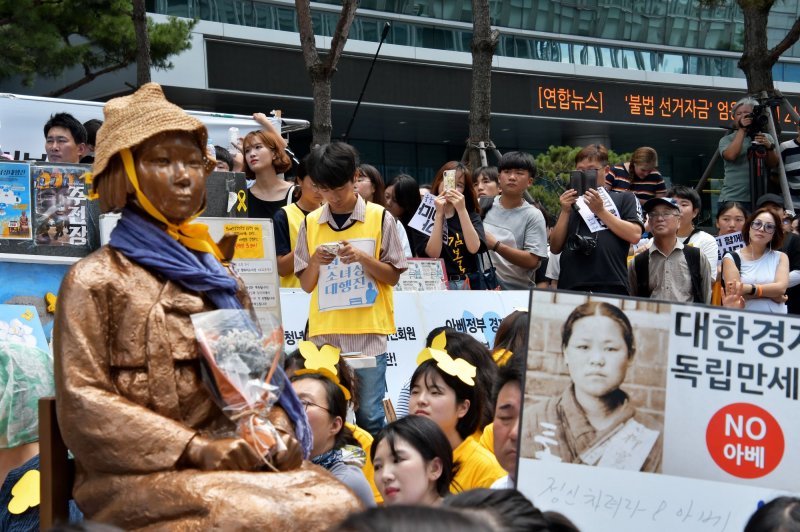By Thomas Maresca

The issue of comfort women, the euphemism for sex slaves used by Japan during World War II, has remained a deeply contentious issue between Seoul and Tokyo.
File Photo by Keizo Mori/UPI | License Photo
SEOUL, March 29 (UPI) -- Seoul lodged a complaint against Tokyo on Tuesday over new history textbooks which South Korean officials say distort facts about Japan's use of forced labor and sexual slavery against Koreans during World War II.
South Korea's foreign ministry expressed "deep regret" over the textbooks, which were approved Tuesday by Japanese authorities for use by second- and third-year high school students starting in 2023.
The books "distort historical facts of the past in accordance with [Japan's] self-centered view of history, and call for correction," the foreign ministry said in a statement.
Expressions such as "forced labor" were watered down to "conscription" or "mobilization," South Korean officials said, while references to so-called "comfort women" sex slaves were downplayed.
SEOUL, March 29 (UPI) -- Seoul lodged a complaint against Tokyo on Tuesday over new history textbooks which South Korean officials say distort facts about Japan's use of forced labor and sexual slavery against Koreans during World War II.
South Korea's foreign ministry expressed "deep regret" over the textbooks, which were approved Tuesday by Japanese authorities for use by second- and third-year high school students starting in 2023.
The books "distort historical facts of the past in accordance with [Japan's] self-centered view of history, and call for correction," the foreign ministry said in a statement.
Expressions such as "forced labor" were watered down to "conscription" or "mobilization," South Korean officials said, while references to so-called "comfort women" sex slaves were downplayed.
The ministry summoned a senior official from the Japanese Embassy in Seoul to deliver a formal protest, Yonhap reported.

Protesters demonstrate near a statue of a South Korean "comfort women" in front of the Japanese Embassy in Seoul, South Korea, on February 8, 2017. "Comfort Women" were Koreans who served as sex workers for Japanese soldiers during World War II.
File Photo by Keizo Mori/UPI
Japan occupied Korea from 1910 to 1945, a period of colonization that ended with Tokyo's defeat in World War II. Some historians estimate that as many as 200,000 girls and women, mainly Koreans, were used as sex slaves by Japan in military brothels.
The issue of comfort women -- the euphemism used to describe the sex slaves -- has long been a deeply contentious issue in the relationship between South Korea and Japan.
Tokyo contends that the matter was settled in a 1965 treaty that normalized relations between the two countries and a 2015 deal that included an $8 million fund to support victims.
However, a South Korean government task force in 2017 declared the deal inadequate, saying it did not sufficiently address the opinions of the victims themselves. Lawsuits by survivors seeking reparations from Japan have made their way through Seoul courts with conflicting decisions issued last year.
An international group of survivors and advocates sent a petition to United Nations human rights investigators earlier this month, pushing for the comfort women issue to be brought before the U.N. International Court of Justice.
Seoul also protested the textbooks' claims of the Dokdo Islands as Japanese territory that South Korea is illegally occupying.
The tiny islets, which Japan calls Takeshima, are administered by South Korea and have been the source of a long-running territorial dispute.
Japan occupied Korea from 1910 to 1945, a period of colonization that ended with Tokyo's defeat in World War II. Some historians estimate that as many as 200,000 girls and women, mainly Koreans, were used as sex slaves by Japan in military brothels.
The issue of comfort women -- the euphemism used to describe the sex slaves -- has long been a deeply contentious issue in the relationship between South Korea and Japan.
Tokyo contends that the matter was settled in a 1965 treaty that normalized relations between the two countries and a 2015 deal that included an $8 million fund to support victims.
However, a South Korean government task force in 2017 declared the deal inadequate, saying it did not sufficiently address the opinions of the victims themselves. Lawsuits by survivors seeking reparations from Japan have made their way through Seoul courts with conflicting decisions issued last year.
An international group of survivors and advocates sent a petition to United Nations human rights investigators earlier this month, pushing for the comfort women issue to be brought before the U.N. International Court of Justice.
Seoul also protested the textbooks' claims of the Dokdo Islands as Japanese territory that South Korea is illegally occupying.
The tiny islets, which Japan calls Takeshima, are administered by South Korea and have been the source of a long-running territorial dispute.
No comments:
Post a Comment